SABUKO scales up grassland restoration to 25,000 ha, continues to work with the pastoralist community to recover and reconnect wildlife corridors in Kakheti PAGE 9

In this week’s issue...
Beat Plastic Pollution –Competition for Companies and Organizations to Tackle Plastic Pollution!


NEWS PAGE 2
GD Chair on German FM’s Statement: Our Goal is to Get Candidate Status in December
NEWS PAGE 2
At the Crossroads of Choices: When Too Much Is Confusing and Too Little Is Restricting. Part 3
POLITICS PAGE 5
Georgia and UAE Strengthen Economic Ties at Business Forum
BUSINESS PAGE 7
President of Latvia Egils Levits: The Only Side is Ukraine’s Side
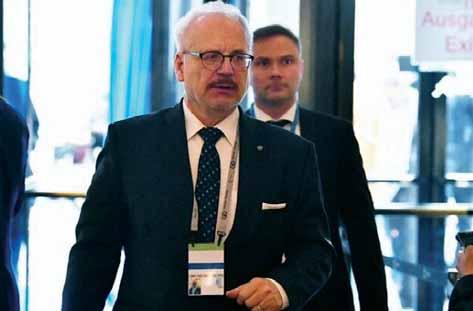
President of Latvia Egils Levits is the first western leader to have spent a night in Kyiv since the war began. As a former judge at the European Court of Human Rights, he is calling for the establishment of a special tribunal on Russia’s aggression against Ukraine, to punish Russia for its war crimes. Radio Free Europe’s Georgian Service sat down with him in Munich to discuss that call, the West’s early naivety, and the Georgian government’s mixed messages.
“We should not wait until Russia is defeated or Putin is thrown from his position,” he tells us. “Not all criminals are present in persona at tribunals. For example, in Yugoslavia, some were tried in absentia - the same can be done with Putin. The most important thing is not that the person is sitting in on the trial as such, but that we are able to dig more into this machinery of war, of aggression; to openly question how such a war is possible, and to open this to the public by judicial means.
Georgia: Outbound Tourism in 2022
ISET PAGE 8
Be Parent - Miracles Happen Here
SOCIETY PAGE 10
PreparedforGeorgiaTodayBusinessby
Source: RFE/RL
Issue no: 1391 • • MARCH 24 - 30, 2023 • • PUBLISHED WEEKLY
PRICE: GEL 2.50
Continued on page 6
FOCUS
ON THE KAKHETI STEPPES
INTERVIEW BY VAZHA TAVBERIDZE FOR RFE/RL
Beat Plastic Pollution – Competition for Companies and Organizations to Tackle Plastic Pollution!
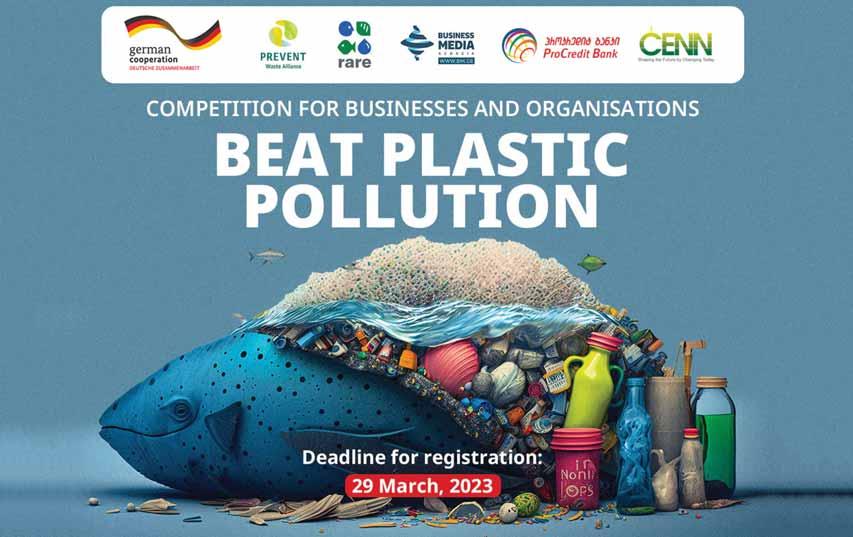
CENN - a non-governmental organization working to protect the environment through fostering sustainable development, with the financial support of the German government and in partnership with ProCredit Bank and BMG, is announcing a competition to tackle plastic pollution!
The initiative invites public, private, and civil sector representative organizations and companies to participating by pledging to reduce consumption and procurement of single-use plastic items.
In order to participate, you need to gather information about what type of single-use plastics are consumed and make a pledge about which plastics and by what quantity (percentage) you will reduce them.
During the competition, participants will receive guidance and consultation workshops, which will allow the participants to be more targeted and elaborate on their pledges.
As CENN’s objective is to popularize sustainability practices, it is offering active publicity through CENN’s social media platforms and media partners.
Three winners will be revealed in the competition and awarded special prizes!
Registration is possible until March 29, 2023.
For organizations and companies interested in participating in the competition, a Q&A meeting will take place on Friday, March 24, at 2pm via Zoom.
Ukraine Latest: Ukraine Hit with Deadly Strikes; Zelensky Visits Troops on Bakhmut Frontline
come into contact with the US drone.
Death toll in Kyiv rises following overnight drone strikes
At least seven people died following a Russian drone strike on the Ukrainian capital Kyiv in the early hours of Wednesday morning.
Head of Kyiv’s regional police Andriy Nebytov said on Telegram that “a total of 12 drones were shot down by security and defense forces in the Kyiv region during the attack by the occupiers.”
Nebytov said that nine people so far have been injured in the attack, which was carried out by Iranian-made drones.
ZELENSKY VISITS TROOPS ON BAKHMUT FRONTLINE
Bakhmut, even though analysts say the city carries little strategic value.
Kyiv says the battle for the industrial town, which had a pre-war population of around 80,000 people, is key to holding back Russian forces along the entire eastern front.
Yevgeny Prigozhin, the head of Russia's Wagner mercenary group, which claims to be spearheading Moscow's offensive in Bakhmut, said this week that his forces control some 70% of the city.
Zelensky also distributed images of the strike on Zaporizhzhia, showing a projectile smashing into a residential building and a large plume of black smoke rising.
Moscow said it had "repelled" a drone attack by Ukraine targeting the Crimean port city of Sevastopol.
The Crimean Peninsula, seized by Russia from Ukraine in 2014, is home to Moscow's Black Sea Fleet and has been hit by a series of drone attacks since Russia invaded Ukraine.
Russia’s Foreign Minister Sergei Lavrov warned Britain over its plan to supply Ukraine with armor-piercing ammunition containing depleted uranium.
"This is a step towards a further escalation, and a serious one at that," Lavrov said.
Chinese President Xi Jinping left Moscow on Wednesday morning after a three-day visit to the Russian capital that seemed to result in mixed results for the tentative allies.
China’s leader and his Russian counterpart Vladimir Putin reaffirmed areas of strategic cooperation and plans to extend economic ties and increase trade up to 2030. They also both criticized the US for undermining global strategic stability.
But there was little in terms of substance from the meeting, and official statements from both sides, made after talks concluded Tuesday, disclosed few details about the implementation of economic agreements.
In other news, both Ukrainian and
Russian officials said separately that Kyiv and Zaporizhzhia, and Sevastopol in Russian-occupied Crimea, had been targeted by drone and missile attacks Wednesday morning.
WHITE HOUSE DOWNPLAYS PUTIN AWARDING RUSSIAN PILOT INVOLVED IN DOWNING US DRONE OVER BLACK SEA
The White House downplayed Russian President Vladimir Putin’s presentation of an award to one of the pilots involved in the downing of a US drone over the Black Sea.
“I don’t know of another military in the world that would award a pilot for ramming into a drone,” National Security Council spokesman John Kirby said.
“I don’t know why they would throw a bravery award at a pilot who was at best an idiot,” Kirby added.
Last week, Russia’s Ministry of Defense claimed its two fighter aircraft had not
Ukrainian President Volodymyr Zelensky visited Ukrainian soldiers on the Bakhmut frontline in eastern Ukraine.
At least one person was killed and 32 more injured in a block of flats in Zaporizhzhia, a city near the frontline, just before Zelensky announced his visit, the mayor said.
During the visit to the front near Bakhmut, which has seen the longest and bloodiest battle of Russia's invasion, Zelensky recognized the troops had a "difficult" task.
"I am honored to be here today to award our heroes. To shake hands and thank them for protecting the sovereignty of our country," he stated.
Video released by Zelensky's office showed him meeting servicemen in a warehouse and handing out state decorations.
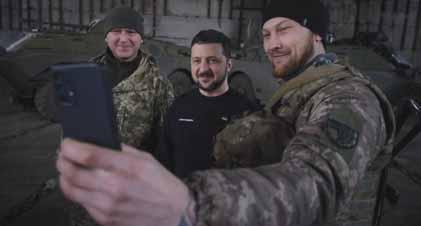
Russian and Ukrainian forces have invested heavily in the battle for
"We will certainly respond to every blow of the occupier on our cities," he said, citing "Russian strikes on Zaporizhzhia and the night attack on the Kyiv region."
As the battle grinds on, the International Criminal Court rejected threats reportedly made against the court by a key ally of President Vladimir Putin after it issued a war crime warrant against the Russian leader.
Former Russian president Dmitry Medvedev reportedly talked about targeting The Hague, where the court is based, with a hypersonic missile as a reprisal for the Putin warrant, according to Dutch media.
The presidency of the Assembly of States Parties, which groups the ICC's 123 member countries, said it "regrets these attempts to hinder international efforts to ensure accountability for acts that are prohibited under general international law".
The United States dismissed Russia's complaints, with White House National Security Council spokesman John Kirby saying the ammunition was "a commonplace type of munition".
DRONE STRIKES ON KYIV SHOW RUSSIA ISN’T INTERESTED IN PEACE, ZELENSKY SAYS
Zelensky said overnight drone strikes on Kyiv show Russia isn’t interested in pursuing a peaceful end to the war, despite talks with Chinese President Xi Jinping covering Beijing’s proposed peace plan.
“Over 20 Iranian murderous drones, missiles, and shelling in just one night of Russian terror against Ukraine,” he said on Twitter Wednesday.
“Every time someone tries to say the word “peace” in Moscow, another order is given for such criminal strikes,” he added.
Zelensky’s comments came just hours after President Xi left Moscow after several days of talks.
GEORGIA TODAY MARCH 24 - 30, 2023 2 NEWS
Photo: UKRAINIAN PRESIDENTIAL PRESS SERVICE/AFP COMPILED BY ANA DUMBADZE
German Foreign Minister: We See Attempts to Deviate the Country From the Pro-European Course
The Minister of Foreign Affairs of Germany, Annalena Baerbock, has a visit to Georgia scheduled. Before the visit, she made a comment noting that they saw attempts to deviate the country from the proEuropean course, a course which the absolute majority of Georgians support.

“The population of Georgia has defined the European Union as a clear goal. In recent weeks, they took over the streets of Tbilisi with the flags of the European Union, when they held demonstrations to protect pluralism and the rule of law.
“During my visit, I would like to make it clear that Germany fully supports Georgia’s European perspective. We see
GD Chair on German FM’s Statement: Our Goal is to Get Candidate Status in December
attempts to divert the country from the pro-European course. The absolute majority of Georgians support this course. We see the pressures the country is facing from within and outside. I will talk to the government in Tbilisi about the steps that the country still has to take to get EU candidate status.
“Along with respect for democratic standards, needed is the freedom of the media, an active civil society, and the maintenance of public debate with the principles of mutual respect, even if opinions sometimes differ. We, as the European Union, are united by these values, and we are convinced there can be no shortcuts or concessions,” Baerbock noted.
We know what our goal and agenda are – our goal is to get candidate status in December, - the chairman of Georgian Dream Irakli Kobakhidze said, responding to the statement issued by the German Minister of Foreign Affairs, Annalena Baerbock, ahead of her visit to Georgia.
Kobakhidze claimed that “only the radical opposition creates obstacles on the way to European integration.”
“I don’t know the context of this statement, so it will be difficult for me to comment. We know what our goal and agenda are – our goal is to get candidate status in December, and our agenda is to implement the 12 recommendations.

As for the obstacles on this path – the
obstacles are created from only one side, that of the radical opposition, which is not involved in the implementation of the relevant reforms at all,” he said. Annalena Baerbock is set to visit Georgia. Before the visit, she made a comment noting that they saw attempts to deviate the country from the pro-European course, a course supported by the absolute majority of Georgians.
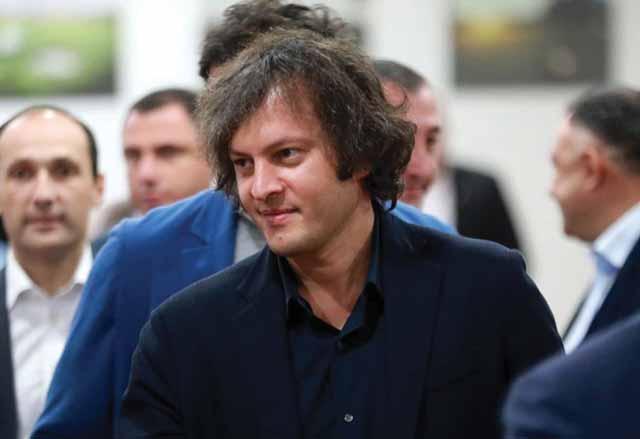
GEORGIA TODAY MARCH 24 - 30, 2023 3 NEWS
Words, Words, Words...
OP-ED BY NUGZAR B. RUHADZE
Warning: If we do not de-ideologize our life in Sakartvelo soon, we will cease to be a productive society, and will instead become one more oriented on the production of words than on creating the kind of useful goods that are indispensable for our physical survival, saying nothing of the ominously crystallized exigency to save the nation’s sinking demography.
It is truly difficult to comprehend why we enjoy using so much time and energy on talk rather than on productive work, education, childbirth and development. Outdoor politics has become a sickness here, and nobody is making any attempt to introduce a remedy to cure it, as society plunges into an ocean of words, mostly of futile substance, not altering from generation to generation. Words, words, words . . . no bottom-line, no consequence, no outcome, no inference, no suggestion, no innovation, no nothing! Isn’t this bizarre?
We never tire of discourse, no matter how nonsensical it might be. One of the most educated presumptions is that this way of life is an extension of the graph, curve and range of values that are characteristic to the part of the world we
want to emulate, where people use lots of words without committing to clearly useful deeds. But why should we take the pernicious example of others?

Couldn’t we be a little different from those ‘others’ and a little independent from them in making choices when it comes to the lifestyle we most prefer?
Independence and freedom should first
be embedded in our own minds and souls, and only after that must they be used as instruments with which to improve life, seeing us asking ourselves to be more self-made than we actually are. This might be achievable if we turn away from our habitual pointless verbosity and, taking the bull by the horns, seek to create tangible prerequisites for pro-
creating progress. To do this, we need to use our homogeneous collective mind and all-out effort, plus translatable-intowellbeing education that too often is sacrificed in this country for the doubtful reason of taking to the street.
The best conclusion from this epistolary effort seems to be the following formula: Let’s give more chances to work
than to word. Too much of ourselves is being spent on the pursuit of truth, the finding of which is becoming increasingly unachievable. It is said that truth is singular and versions of lies enumerable. It is hilarious that we are now faced with as many truths as there are men and women in this land of good but confused people.
Historically speaking, our people have lived through various ideologies, among them Marxism, Trotskyism, Leninism, Stalinism, Fascism, Despotism, Liberalism, Populism and many other understandable or incomprehensible isms that were used at various times to wash our poor brains. It is high time for us to realize that no isms can help us out of the woods, only tireless labor and education to finally conceive our capability to discern between the right and wrong of ongoing social processes, be they natural or deliberately instigated, which create insurmountable contradictions in our everyday lives.
It is unfortunate that the individual subjectivity inherent to us and social behavior are never in unison in our political reality. We have to rid ourselves of the expectation that there are optimal teachers out there who will write infallible precepts for us, explaining how to behave and where to go. We need to wake up and do as Jesus once prompted us: Render unto Caesar what is Caesar’s and unto God what is God’s.
South Caucasus and the Great Power Competition
 ANALYSIS BY EMIL AVDALIANI
ANALYSIS BY EMIL AVDALIANI
With Russia’s second invasion of Ukraine, the power competition has intensified in the South Caucasus. Though applied to different regions of Eurasia, where continental powers vie for energy resources and control of strategic swathes of lands, an application of the concept for the South Caucasus has yet to be made. The region is a good study case of the intensifying rivalry, especially because three Eurasian powers—Iran, Russia, and Turkey—increasingly strive to build a new system and mode of behavior for Armenia, Azerbaijan, and Georgia. In other words, the study of the Eurasian powers’ behavior in the region sheds light on some critical elements of the emerging world order.
To be sure, competition has always been present in the region. Even in the wake of the Soviet collapse and America’s unipolar moment, the rivalry in the South Caucasus was evident in the form of advancing competing infrastructure projects, support for separatist regimes to limit Western penetration, and the relatively high pace of militarization. In the course of the last several years, the competition has become more pronounced, with all the above trends suggesting a more intense character both among the players which surround the South Caucasus, and between the regional and external (mainly the collective West) powers. China, a relative newcomer to the region, will be seeking to attain knowledge of the geopolitical intricacies to elevate its economic presence in the South Caucasus and play a greater role on par with the regional powers.
The regional powers put a special emphasis on building new regional organizations, aiming to cement their position. There is still a lack of agreement among the regional powers on which security cooperation and conflictresolution mechanism is most acceptable, yet the evolving process indicates the growing ability of Iran, Turkey, and Russia not only to influence the region, but also to preclude external powers and ultimately construct a new order from the Black Sea to the Caspian basin.
Russia’s calculus on developing better
relations with Turkey and Iran is clear to see on the regional map. Common understanding with Ankara and Tehran allows Moscow to fortify its position not only in the South Caucasus but in the two spaces flanking the region. In the Black Sea, Russia wants to manage together with Turkey, and in the Caspian basin with Iran. Other littoral states matter less, though when deemed necessary they can be consulted or forced into agreement. The critical element here, however, is the exclusion of nonregional powers from exercising influence. For instance, the 2018 convention on the legal status of the Caspian Sea talks about the “non-presence in the Caspian Sea of armed forces not belong-
ing to the Parties”. The approach resuscitates the regional ownership concept, when regional powers tend to squeeze out non-regional actors. Essentially, Iran, Turkey, and Russia manage three interlinked spaces which make up the whole corridor from Central Asia to eastern Europe. The regional ownership says a great deal about the changing world order and its impact on the South Caucasus. The pursuit of exclusive geopolitical rights also signals the re-emergence of the spheres of influence idea. Criticized in the West as a relic of the past, the notion creeps back to life as the liberal order finds itself increasingly hurdled by internal and external challenges. Russia
has always been a staunch supporter of the concept, as it guarantees a special place in South Caucasus affairs, as it has since the Soviet collapse. But Moscow has also been cautious not to overestimate its power, mindful of its limits, and seems willing to approach the regional and global geopolitical trends more realistically. The latter means seeing the South Caucasus not as an exclusive Russian sphere of influence, but rather as a space where it would have to both cooperate and compete with other regional powers. The difference is that Moscow now prefers to talk to Iran, and more so Turkey, in responding to rising challenges. Here, too, Russia seeks primacy, but it understands
that in a highly globalized world and amid its disastrous invasion of Ukraine, managing the region as the Russian Empire or later the Soviets did is now impossible. Therefore, working with Ankara and Tehran seems more suitable to Moscow’s long-term interests. Moscow wants a loosely built system not organized or regulated by strict rules peculiar to alliance logic. Russia will also try to build a sort of a hierarchical system where it wants to hold the foremost place. In a way, this will be similar to the “first among the equals” idea, where the hegemon’s prestige and military power are decisive and serve as an effective preventer of disagreements spilling into open rivalry.
GEORGIA TODAY MARCH 24 - 30, 2023 4 POLITICS
Image source:
Image by Julia Barnes / for NBC News
AFP/scanpix
At the Crossroads of Choices: When Too Much Is Confusing and Too Little Is Restricting. Part 3
BY VICTOR KIPIANI, CHAIRPERSON OF GEOCASE
Say: Polelss or Mulripolar? Well, this is not a play on words, because - whether poleless or multipolar - they have essentially different effects. Nevertheless, they are both characterized by the fact that there is no single global hegemony or "collusion" between the two superpowers to share global influences. However, the similarities between the two end here, and further on, differences emerge. In some places this difference is structural, in some places it is functional, but in both cases, we arrive at different regimes of global (dis)order.
The poleless system is characterized not only by the abundance and diversity of "decision-makers". Along with quantity, this system has serious functional shortcomings, which ultimately manifests itself in haphazard and highly unstable international relations. Moreover, in the face of a specific global threat and challenge, a poleless system may even undergo collapse. In short, the connection between power and influence is very weak, if not almost non-existent, in a poleless system. Some may like it, but with today's complex challenges, the absence of such a connection creates a rift bordering on uncontrollability and chaos. Thus, a poleless system (or haphazardness) can only serve as a backdrop for academic study of other systems. And for the practical purposes of governance or the foreseeable conduct of international affairs, the value of this model, devoid of actual responsibility, is close to zero.
Hence, from a realistic point of view, a possible alternative to the bipolarity replacing the unipolar order is multilateral, that is, a multipolar system of arrangement, about which we have to share with the reader some already known issues and touch on some aspects seen in a new way.
MULTIPOLARITY IN THE MODERN SENSE
Contrary to popular stereotype, the multipolar order should not be understood as an unrestricted and unlimited admission of anyone who wishes to join the "multipolar club".
The original understanding of the multipolar world order was based on the coordinated (cooperative) actions of several states or groups of states, the purpose of which was to provide an intelligible system of relations that pleased some and was disliked by others. Simply put, the "big ones" set the rules of the game for themselves as well as for the "small ones"; the "big ones" also determine the forms of "disciplinary punishment" for violation of these rules; And the whole system is built on a balance of power and equilibrium acceptable to the "majority shareholders".
As for the multipolar order as it is understood today, another characteristic of it is that it has gone beyond its original limits, which at the time was defined only by the participation of states in international relations. As these relations have gradually changed their essence and character, the influential poles are not only related to the capacity to act as a capable subject of countries. The global distribution of influence also involves inter-state groupings (e.g., the European Union), large international financial organizations (e.g., the World Bank and the International Monetary Fund - the pillars of the "Washington Consensus"), sovereign funds (e.g., the Qatar Sovereign Fund) or transnational corporations (Google, Amazon, etc., to name a few). Moreover, such quasi-state actors claim their share of the multipolar world, which by virtue of the power factor have a say in both internal and external affairs of a particular country (one of the brightest manifestations is the Guards Corps of
the Islamic Revolution of Iran, the "Wagnerian" formation). Despite this multiplicity, power and influence are still selectively distributed among the participants of the system, which contributes to a guaranteed minimum degree of stability and coherence in terms of international security and economic order. This situation does not exclude elements of unipolarity by inertia, but even in this case an ex-unipolar (former hegemon) country has to take into account the interests of others and cannot act in the old way, without looking back. Since we started talking about the multipolar order, in addition to the above, it is necessary to mention some specific elements.
THE OVERALL EFFECT OF REGIONALIZATION
We mentioned the need to diversify the various actors of the system in a multipolar world, and this was correct. In addition, the possible transition to multipolarity will be characterized by the emergence or consolidation of major georegional centers. Most of the issues related to regional interests and influences will be formed within such centers - a kind of geo-political and geo-economic geographical hubs, and will be solved within the same context.
The stability of the global international order based on such a "regional networking" will depend on the coincidence of interests in the space of a particular region, as well as on the reconciliation of interests with other major regional centers and on coordination with each other. At such a time, the prevention of large-scale world conflicts (the so-called proxy war, typical of the Cold War period, will probably still be on the agenda) will again and again be conditioned by finding the right balance of power.
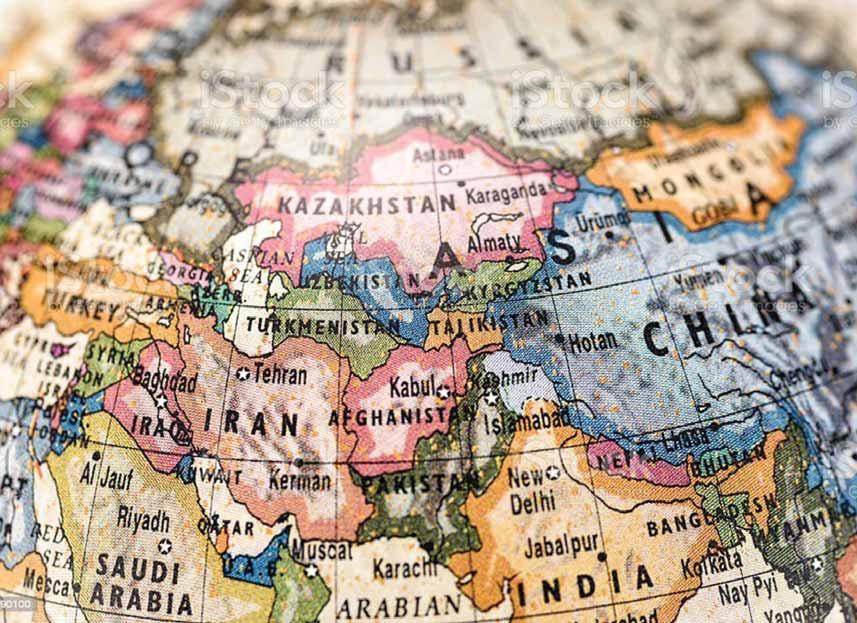
It should be noted that a large region of the Black Sea is currently being formed as one such large geographical area, and in this process the increasing role of not only intra-regional - the socalled regional superpowers, but also of "external" global superpowers is
being felt with every passing day.
REGIONALIZATION BY INTERESTS
The formation of mini-alliances or groups of states is probably one of the most relevant areas, which we, as a country in the Black Sea region, should pay special attention to. Practically, we are talking about "situational associations" united on the basis of the principle of coincidence of interests and around a certain agenda, which have no special formal rules. For the most part, such associations are formed and operate outside the formal institutions that come with the existing world order. To illustrate this trend, it is enough to mention such situational, so-called ad hoc mini-alliances as AUKUS (Australia, Great Britain, USA), QUAD (USA, Australia, India, Japan) or I2U2 (India, Israel, United Emirates, USA).
A situational alliance based on interests is a kind of intermediate model between a bipolar and a multipolar world. In the same context, the question is very relevant: to what extent does this trend contribute to stability in the world and the prevention of conflicts? Does this trend create additional preconditions for fragmentation in terms of the possibility to manage global processes?
Of course, these questions are reasonable. However, one or another answer to them will still be preliminary and intermediate, since a clear and final position must be formed by the relatively long-term practice. That said, one thing is already clear: one way or another, in order to take care of security, the unification of regions by interests is a direct response to the inefficiency and ineffectiveness of existing security systems. In its essence, the association of the mentioned category is more practical, flexible, economical and purposeful, which, compared with large bureaucratic organizations, creates the prerequisites for a faster and more adequate response to the problem.
It should also be noted that regional mini-alliances are able to cooperate not
only on security issues, but also on other topics of interest to them (for example, the tasks of I2U2 include technology and infrastructure, while the narrow specialty of Five Eyes is intelligence sharing). With less bureaucracy in decision-making, an alliance is much better able to focus on geographies relevant to it, saving it from wasting resources on "secondary geographies". The relative advantage to be highlighted here is the practical, rather than ideological, considerations of joining a mini-alliance or interest group. In other words, the potential member state makes this decision to pursue its interests subject to rational alignment with the interests of other member states. As a result, the decision-making process is as free as possible from unnecessary conceptual "isms," ideological dogmas or unnecessary hypocrisy.
With this in mind and in the context of the above trend, we would like to once again draw the reader's attention to the Great Black Sea Region and the need to form a thematic alliance within it. We spoke many times about the specific mechanism in the past. And this time we will again raise the initiative of a framework document of the Black Sea Declaration, discussed in one of the previous articles, which would serve the political and economic integration of the countries of the region, including a modern consultation and coordination format, adapted to the times and the needs of new channels of communication.
Such a declaration emphasizes the importance of the Black Sea region for the stability of the world and the region.
Along with a number of relevant topics, the declaration: (1) Stresses the partnership of the parties for regional security;
(2) Specifically considers the region as a territory free from harmful influences and "zones of special interest"; (3) Emphasizes the need to raise funds for the diversification of regional infrastructure, as well as the need to implement socially and environmentally sustainable projects in the region; (4) Points to frozen socalled ethnic, but in fact geopolitical
conflicts, and expresses support for the sovereignty and territorial integrity of the countries of the Black Sea region;
(5) Provides a platform to discuss current issues of regional security, such as challenges related to terrorism and illegal migration; (6) Outlines directions for free trade agreements and blocs of regional scope.
In addition to the above, the attention of the declarants would be additionally and specifically focused on attracting investment to the region. As one of the specific initiatives, we would consider, for example, the initiation of the "Black Sea Prosperity (Development) Belt" under the declaration of a major regional project. The objectives of the project would include the mobilization of financial resources for the development of regional infrastructure, as well as reducing dependence on certain energy sources, the implementation of social and environmental target programs, etc. As it stands today, the "belt" concept organically encompasses recent statements about two major projects, the Black Sea submarine cable and the Anaklia Deep Sea Port. The same line would be strengthened by the successful implementation of the Middle Corridor in the shortest possible time, with the political and economic dividends coming from it for our country and the region.
Here, we should also add that to ensure the necessary functional quality we should consider holding regular summits of the highest rank at the level of heads of member state of the declaration and high-ranking representatives of strategic partners and allies. The main goal of regular summits is to support the independence, sovereignty and territorial integrity of the countries of the region. Topics of discussion among summit participants should also include the real geopolitical (rather than so-called "ethnic") conflicts in the region, regional security in general, international terrorism, cyber security, illegal migration and other pressing issues and challenges.
To be continued in next week’s GT.
GEORGIA TODAY MARCH 24 - 30, 2023 5 POLITICS
Image source: istock
De-oligarchization Bill Reverted
to Parliament for 2nd Reading Following Venice Commission Comments
The de-oligarchization bill, a draft already passed in two readings, has been reverted to the Parliament for discussion in the second reading.
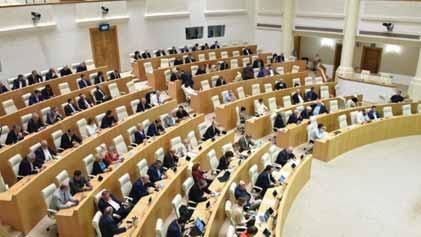
Chair of the Parliament’s Legal Affairs Committee, Anri Okhanashvili, clarified that the conclusion of the Venice Commission was the reason for this decision.
“We should continue debating these conclusions and recommendations at the committee meeting to identify the issues that, in the opinion of the Venice
Commission, need to be clarified and corrected. As a result, we decided not to debate the bill in the third reading and instead re-examine the corrected version at the next plenary session,” Okhanashvili stated.
The Venice Commission published an interim opinion regarding the de-oligarchization bill and stated that the document sent from Georgia is based on personal approaches and is not systematic, as such failing the goal of serving to strengthen institutions and the legal framework.
EU: We Held Fruitful Dialogues with Georgia & Moldova, Provided Both With Concrete Support
Our commitment to the Eastern partners, especially in response to Russia’s aggression in Ukraine, has been further boosted. The EU candidate status and European perspective provide a solid basis to deepen our cooperation agendas, – reads the EU’s annual progress report on the
Implementation of the Strategic Compass for Security and Defense, which was presented by the High Representative of the Union for Foreign Affairs and Security Policy to the EU Council.
“The EU and its Member States have mobilized the entire scope of their instruments to support Ukraine, reaching at least EUR 67 billion in military, financial, eco-
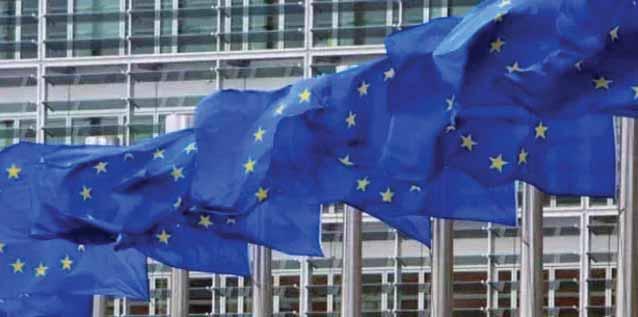
President of Latvia Egils Levits: The Only Side is Ukraine’s Side

Continued from page 1
In other cases, too, in Rwanda, Sierra Leone and Liberia, the criminals were not necessarily sitting in on their trials, but it is an important process to show society that such behavior is unacceptable. And I think this principle is more important than having everyone on the bench.”
THIS WAR HAS GIVEN YOU AND YOUR BALTIC NEIGHBORS AMPLE REASON TO TELL THE REST OF THE WEST: “WE TOLD YOU SO” FOR WHAT YOU SAY WAS “AN ENORMOUS MISTAKE AND NAIVETY OF MOVING PURPOSEFULLY TOWARDS DEPENDENCE ON RUSSIA, DESPITE OUR WARNINGS”. HOW DID THIS NAIVETY COME ABOUT?
This naivety was born because, after the Cold War, the West was not paying enough attention to the internal processes in Russia. Had they looked more closely at what happened to Russia and better analyzed it, then, of course, they would have discovered that it was an illusion that they had; the dream of having a democratic Russia. And I think this is the reason. It was negligence, I would say.
AND WHY DID THEY NOT LISTEN TO YOUR WARNINGS?
We were warning them, but, of course, it wasn’t a comfortable message to hear. The dream was more comfortable than recognizing the bitter reality.
ONE SUCH WARNING COULD PERHAPS HAVE BEEN THE WAR IN GEORGIA IN 2008.
Of course, the Russian aggression started in 2008 in Georgia, and the Baltic states reacted immediately. Our presidents went to Tbilisi because we knew what it means when Russia attacks a country. But the reaction from the rest of Europe was relatively weak, and this led Russians to conclude that the entire West is weak, led to them believing they could go further. The next step was Crimea in 2014. And then, of course, consequently, from the Russian point of view, 2022 - a full scale attack on Ukraine. We must draw the right conclusions, and now it seems the West really has understood what the Russian character is all about, and what Russia is, and they have developed a strategy to deal with it.
ANOTHER CAUSE YOU ARE CHAMPIONING IS TO FREEZE RUSSIAN ASSETS AND GIVE THEM TO UKRAINE, TO
REBUILD THE COUNTRY AFTER THE WAR. YOU HAVE SAID IT’S DIFFICULT, BUT DOABLE. IF THE WEST REALLY HAS WOKEN UP, WHY HASN’T THIS FREEZE HAPPENED YET?
The development of political will on [opposing] Russia is a continuous process. If we see how the West now sees Russia today, and compare it to one year ago or maybe half a year ago, then there is development, and this development is in one direction. There is a growing will to [freeze those assets]. We haven’t reached that point yet. But before that point come discussions and dynamics, and that is where we are at right now.
WE’VE BOTH HEARD PRESIDENT ZELENSKY SAY THAT UKRAINE “MUST BE IN NATO, MUST BE IN THE EU.” YOU SHARE THAT SENTIMENT. MY QUESTION IS – WHEN?
On the European Union membership, I can’t say when, but I can say that there
is serious will from all member states that it should be as soon as possible. I don’t think it will take very long, but not in the next few years.
WHAT ABOUT NATO? I THINK WE CAN CONCLUDE THAT UKRAINE NOW HAS ONE OF THE BEST ARMIES IN THE WORLD.
I think that discussion will be renewed after the war. I really see Ukraine as a member state of NATO, because, as you rightly said, it will be one of the best armies in the world and a real contribution to the Alliance.
MOLDOVA AND GEORGIA ALSO HAVE ASPIRATIONS TO BE IN THE EUROPEAN UNION, AND ONE OF THEM
AT LEAST HAS ASPIRATIONS FOR NATO. HOW DO YOU SEE THEIR EUROPEAN FUTURES?
Moldova is now under pressure from Russia, but I'd say the government there is
nomic and humanitarian support early February 2023. We held fruitful security and defense dialogues and consultations with Georgia and Moldova, and have provided both with concrete support through the EPF and other tools, aiming to enhance their resilience, such as the hybrid threat survey. These efforts will intensify in the next months,” reads the report.
Neutrality is impossible
willing to take all the necessary steps [toward the EU]. Moldova has a big supporter in Romania, and Romania is very much helping Moldova. I expect Moldova could be ready for the EU at more or less the same time as Ukraine. Georgia has not yet received candidate country status. My advice would be to start the reforms now, because it’s clear what needs to be done.
DO YOU SEE THE GOVERNMENT IN GEORGIA, LIKE THAT OF MOLDOVA, WILLING TO TAKE THE NECESSARY STEPS AND DEDICATE ITSELF TO REFORMS?
I would only say that, according to the statements of the government, the government is willing [to do so].
YOU WERE AN AMBASSADOR TO HUNGARY. WHEN ASKED WHOSE SIDE HE WAS ON IN THIS WAR, ORBAN REPLIED “ON THE SIDE OF HUNGARY.” LATER, THIS WAS ECHOED IN GEORGIA, WHERE OUR LEADERSHIP SAID THEY WERE “ON GEORGIA’S SIDE.” WHAT DO YOU THINK SUCH STATEMENTS MEAN?
[Chuckles] I'm looking for a diplomatic answer. It is up to Hungary to define its interests, but it is a member state of NATO, a member state of the European Union, and national interests should be aligned with the common interests.
YOU DON’T SAY “I AM ON THE SIDE OF LATVIA IN THIS WAR,” BECAUSE IT’S OBVIOUS THAT BEING ON UKRAINE’S SIDE MEANS BEING ON LATVIA’S SIDE AS WELL. WHY IS THIS DIFFERENT?
The motivation is to be somehow neutral, but neutrality is impossible in this case, because we have a case where there is a clear aggressor and a clear victim. Neutrality in such a case means being on the side of the aggressor.
GEORGIA TODAY MARCH 24 - 30, 2023 6 POLITICS
President of Latvia Egils Levits. Source: World Economic Forum
For a member state of the European Union national interests should be aligned with the common interests
Georgia and UAE Strengthen Economic Ties at Business Forum
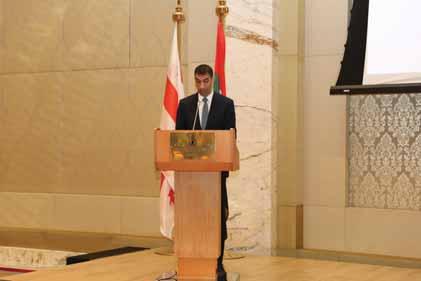
On March 17, the Biltmore Hotel in Tbilisi hosted the UAE-Georgian Business Forum, organized by the Georgian Chamber of Commerce and Industry. The forum was attended by more than 250 business representatives from both countries, including leading companies from various sectors such as large retail chains, agriculture, hospitality, food products, transport, real estate, and information technology.
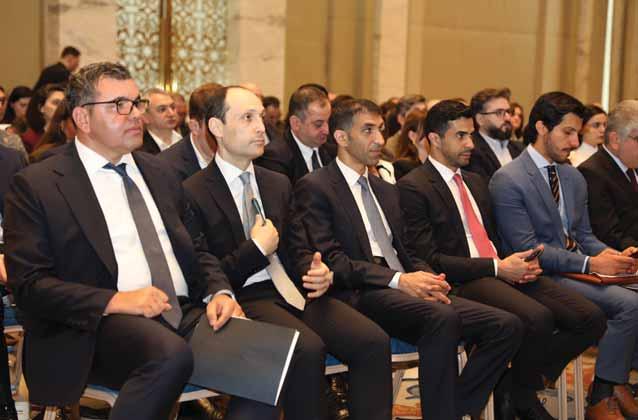
The forum was held within the framework of the visit of the UAE Minister of State for Foreign Trade and the delegation organized and hosted by the embassy of the UAE in Georgia.
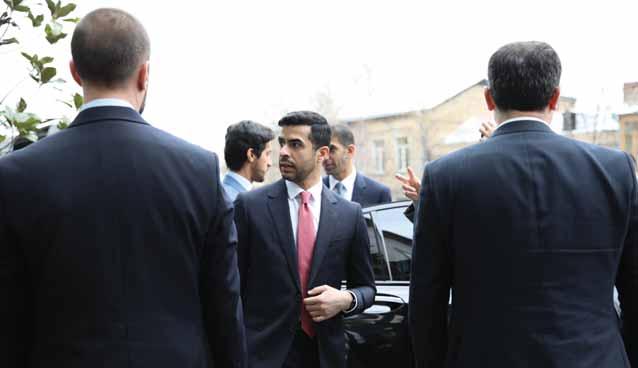
The event was opened by the Vice Prime Minister, Minister of Economy and Sustainable Development of Georgia, Levan Davitashvili. Welcome and opening remarks were also delivered by HE Dr. Thani bin Ahmed Al Zeyoudi, UAE Minister of State for Foreign Trade, HE Giorgi Pertaia, President of Georgian Chamber of Commerce and Industry,
HE Abdalla Sultan Al Owais, Chairman of Sharjah Chamber of Commerce and Industry, and HE Rashed Abdul Karim Al Balooshi, Undersecretary of Department of Economic Development – Abu Dhabi. Deputy Director of Enterprise Georgia – Tornike Zirakishvili delivered the presentation about the investment environment, opportunities, and the country’s outlook.
One of the main highlights of the forum was the increase in export and import between Georgia and the UAE. Last year, the trade turnover reached 460 million Dollars, with export increasing by 51% and imports by 98%. This increase in economic relations between the two countries has led to discussions about the possibility of establishing a free trade agreement. According to Levan Davitashvili, three rounds of negotiations have been held since September last year, and the process has been successfully completed today. The agreement will not just be a free trade agreement but a comprehensive document that will regulate issues of the origin of goods
Russian Duma: Georgia and Russia are on the Verge of Restoring Direct Flights
for him to estimate when these decisions will be made and in what order.
Based on the decree of the President of Russia, Vladimir Putin, Russian airlines were prohibited from flying to Georgia from July 8, 2019. On this date, the decision of the Ministry of Transport of the Russian Federation to suspend the flights of Georgian airlines to Russia came into force. The Russian authorities took this step after several thousand people organized an anti-Russia rally in Tbilisi on June 20, 2019, at the parliament building.
“The foreign policy department of Russia noted that the ban on Russian airlines to carry out air transportation is temporary, and the main conditions for its cancellation being the stabilization of the situation in Georgia, the cessation of the Russophobic campaign and the disappearance of threats to the safety of citizens of the Russian Federation. On December 26, 2022, Deputy Minister of Foreign Affairs of the Russian Federation Mikhail Galuzin stated in an interview with TASS that Russia does not exclude the cancellation of the visa regime for citizens of Georgia, if the conditions are met,” reports TASS.

and free trade in services to encourage economic relations between the two countries.
The UAE delegation expressed their interest in investing in various sectors of Georgia’s economy, including hospitality, infrastructure, food security, and production, as well as port infrastructure and banking systems. To further promote investment and business ties, participants
had the opportunity to participate in bilateral business meetings, discuss investment opportunities and potential partnerships.
Overall, the UAE-Georgian Business Forum proved to be a fruitful event, strengthening economic ties between the two countries and laying the groundwork for future cooperation and investment opportunities.
Application ‘Fix Tbilisi’ to be Launched, Allowing Citizens to Report Infrastructural Problems
Tbilisi City Hall is working on an application called “Fix Tbilisi”, where citizens will be able to post information about and infrastructural problems they spot in the capital, Tbilisi Mayor Kakha Kaladze said at this week’s meeting of the municipal government. He noted that citizens will be able to provide information to the municipality through the mentioned application without needing to call the hotline.
“‘Fix Tbilisi’ is a special application that every citizen will have access to. It will be a means of communication between the municipality and citizens, the purpose of which is to provide the
municipality with information about infrastructural problems in the capital without needing to go through the hotline. The information will thus be more complete and the municipality will be able to more easily identify the problem,” Kaladze claimed.
The application will initially collect information on damage to road infrastructure, trees and plants, outdoor lighting and park infrastructure.
The Mayor said the application will be launched on May 1, and citizens will receive updated information about the work on the problem they identified. Kaladze added that he will introduce detailed information about the terms of use of the application to the public in April.
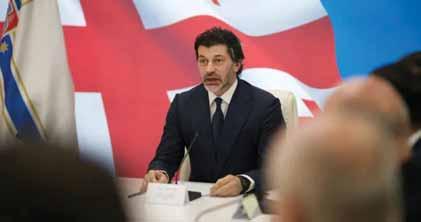
GEORGIA TODAY MARCH 24 - 30, 2023 7 BUSINESS
officials…
According to Leonid Kalashnikov, deputy of the Russian
Duma, Russia and Georgia are on the verge of restoring direct air traffic and canceling visas.
“I talked to many of the highest-ranking
Very sensitive issues
that
we need to resolve – air traffic and the cancellation of visas in Russia. We are on the verge of making these decisions,” Kalashnikov said at the economic forum which was dedicated to the development of economic relations between Russia and Georgia.
Kalashnikov claimed that it is difficult
In 2022, the number of outbound visits made by Georgian residents tripled compared to 2021 and reached 1.7 million. Notably, the recovery in outbound tourism from Georgia had been gradual before a rapid jump in Q2 of 2022. In total, in 2022, the number of outbound visits reached 71.3% of the corresponding figure for 2019.
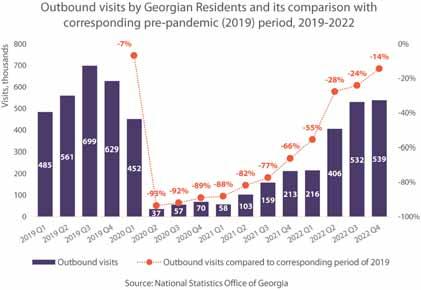
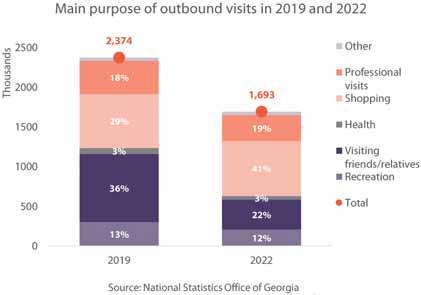

The top destination countries in 2022 for outbound visitors from Georgia were largely similar to those before the pan-
demic broke out, with an exceptional difference in the case of Azerbaijan, which accounted for only 1% of outbound visits from Georgia, compared to 23% in 2019. This could be almost entirely explained by the strict land border measures maintained by Azerbaijan. In 2022, a significant proportion of the outbound visitors chose Turkey (54%) as their destination, followed by Russia (14%), the EU (11%), and Armenia (7%). Among destination countries, outbound visits to Turkey recovered to 89% of the
2019 total, while for Russia it exceeded the pre-pandemic total significantly (by 49%).
OUTBOUND TOURISM INDICATORS

The distribution of outbound visits by the main purpose of visit in 2022 showed some differences compared to 2019. In 2022, the share of visiting friends and relatives in total visits declined by 14 pp, which could partially be attributed to Azerbaijan closing its land border with Georgia. Meanwhile, the share of shopping increased by 12 pp, becoming the top purpose of outbound visits in 2022. The expenditure of outbound visitors in 2022 reached GEL 1.8 billion, which is just 12% lower than in 2019. Notably, the recovery of expenditure has been gradual, and in Q4 of 2022, this exceeded the corresponding figure for Q4 of 2019 by 5%.
The considerable recovery of expenditure could be partially attributed to an increase in the average number of nights spent in outbound visits. In 2022, the average number of nights spent was equal to 6.1, which is 2.17 nights more than in 2019.

The expenditure distribution in 2022 was similar to 2019, with the exception of a significant increase in the share of shopping (42% of total expenditure) and a decline in the share of recreation and accommodation.
HOTEL PRICE INDEX IN GEORGIA
In February 2023, in Georgia the hotel price index decreased by 1.6% compared to January 2023. The 3-star, 4-star, and 5-star hotel price index decreased by 1.6%, while for guesthouses, the price index decreased by 16.7%. The monthly HPI was the highest in SamtskheJavakheti (6.4%) and the lowest in Tbilisi (-5.4%).
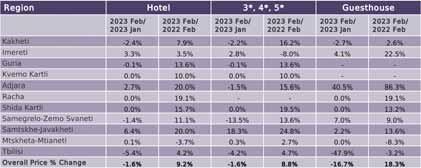
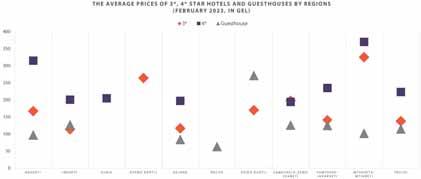
In February 2023, compared to February 2022, hotel prices in Georgia increased by 9.2%. The prices of 3*, 4*, 5* hotels increased by 8.8% and the prices of guesthouses increased by 18.3%. The yearly HPI was the highest in Samtskhe-Javakheti (20%) and Adjara (20%) and the lowest in Mtskheta-Mtianeti (-3.7%).

Thus, by region, the increases in monthly HPI and yearly HPI were highest in Samtskhe-Javakheti, which could be attributed to the FIS Freestyle Ski and Snowboarding World Championships 2023 being held in Bakuriani.
THE AVERAGE HOTEL PRICES IN GEORGIA
In Georgia, the average cost of a room in a 3-star hotel was 140 GEL per night in February 2023, while the average cost of a room in a 4-star hotel in Georgia was 236 GEL per night and the average cost of a room in
a guesthouse was 116 GEL per night. The average cost of a room in a 5-star hotel in Georgia in February 2023 was 392 GEL per night. In Kakheti, the average price was 562 GEL, followed by Tbilisi – 489, Samtskhe-Javakheti – 454, and Guria – 339.
GEORGIA TODAY MARCH 24 - 30, 2023 8
BUSINESS
SABUKO Hosts Public Presentation of Project ‘Kakheti Steppes: Balancing between a Living Landscape or a Future Desert’
We plan to arrange several additional gabions there, which will contribute to not only expansion of the floodplain forest, but also composition change – important species will appear,” Mikeladze notes.
The project also aims to support farmers in supply chain development, thus helping them receive additional income without increasing pressure on the pastures. As such, sheep cheese supply development and exploring its potential is planned both within Georgia and abroad.
“Of course, with such complex issues to be solved, no single organization could manage. The cooperation we have with various state and non-governmental organizations is very valuable to us. We, the SABUKO team, cooperate with various sector representatives to ensure more effective work in all the directions: Ministry of Environmental Protection and Agriculture of Georgia, the Agency of Protected Areas, Sustainable Land Management Agency, NGOs such as CNF, REC Caucasus, etc., Export Development Association and many more. We hope that this cooperation will further deepen in the future,” Mikeladze concludes.
BY ANA DUMBADZE
On March 17, the organization SABUKO, Society for Nature Conservation and Birdlife Partner in Georgia, presented to the wider audience the project it is currently implementing in Kakheti region, titled “Kakheti Steppes: Balancing between a Living Landscape or a Future Desert”.
SABUKO has been implementing the landscape restoration project since January 1, 2019, with the support of the Cambridge Conservation Initiative. As part of the project, the organization developed a rotational grazing scheme which noticeably improved the grass cover condition on the ground.
Following the successfully implemented first phase of the project ‘Restoring Gallery Forest and Grasslands in the Iori River Valley,’ now, SABUKO, along with its partners, is launching the second phase, scaling up grassland restoration to 25,000 ha and continuing work with the pastoralist community to recover and to reconnect wildlife corridors in Kakheti.
The goal of the project is to preserve the steppe and semi-arid landscapes between the Iori and Alazani rivers in southern Georgia, and restore wildlife, ecosystems and cultural values unique in Europe.
The project presentation was attended by representatives of Ministry of Environmental Protection and Agriculture of Georgia, Agency of Protected Areas, target groups, the media and citizens interested in ecological preservation.
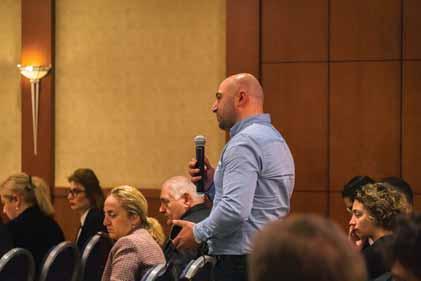
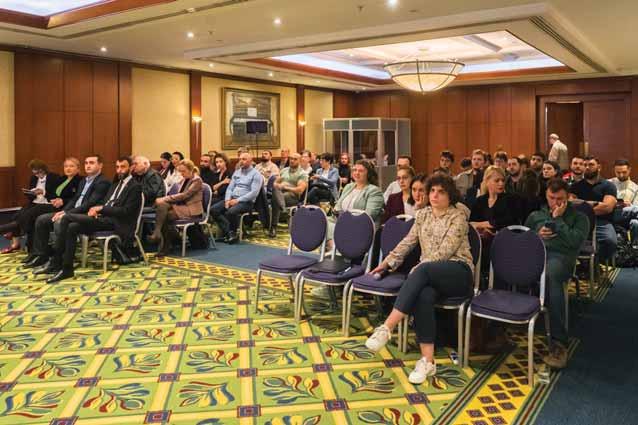
Aleksandre Mikeladze, Project Manager, and Marinus Gebhardt, a pasture restoration expert, presented the project and activities planned within it to the audience, which was followed by a Q&A session, allowing the attendees to get more detailed information about the project and its benefits in terms of ecological preservation on the ground.
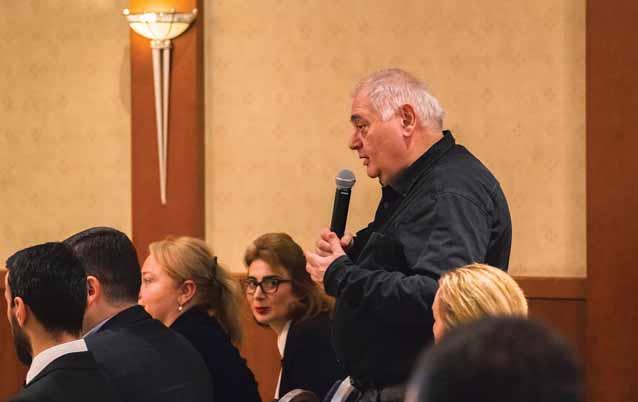
The event was followed by a project committee meeting, where committee members discussed essential details related to the project.
Aleksandre Mikeladze spoke to GEORGIA TODAY about the importance of the project and SABUKO’s cooperation with the Ministry of Environmental Protection and Agriculture of Georgia and the Agency of Protected Areas as part of it.
“For SABUKO, cooperation with both the state agencies and non-governmental sector is equally important, as we’re implementing this project through cooperation with our partners and with their support. The first stage of the project covered the Chachuna Managed Reserve located in Georgia’s Dedoplistskaro municipality, which has faced a severe problem of degradation due to unregulated grazing, while the second phase will cover Chachuna, Kotsakhura Range, Samukhi Valley and Vashlovani Protected Area.
“For us, it’s also very important that the local population be actively involved in the process. As the territories are used as winter pastures, we are in regular contact with farmers when they are on the ground and we introduce them to our planned activities. Sustainable management of pastures is an important component of the project and envisages introduction of a rotational grazing scheme. So far, we have introduced rotational grazing to a territory of more than 3000 ha. Now, as part of the project, it is planned to increase this area to 25,000 ha. This also includes determining the number of sheep per hectare. We are creating and implementing relevant schemes through consultations with local farmers, not only by ourselves, in order to ensure that our activities bring tangible results,” he says.
“Another important part of the project is ensuring ecological unity, which envisages development of such a management plan which provides sustainable management of all the above mentioned areas included in the project: Chachuna, Kotsakhura Range, Samukhi Valley and
Vashlovani Protected Area.
“A new component was also added to the project – sustainable management of water. In the project area, there is floodplain forest which is a home to local biodiversity. On the initiative of SABUKO, a gabion has been arranged on the spot, which slows the water flow, raises the water level mark and allows the area to be flooded. Through such measures and gabions, the situation has been partially improved in terms of species restoration.
SABUKO’s pasture restoration expert Marinus Gebhardt tells us that it is very important that local shepherds also focus and work more on the protection of pastures along with SABUKO.
“In Georgia, there is a huge area of pastures. These pastures are not only a natural resource, but also a living space for shepherds. I’d like our work to facilitate the process, seeing shepherds, who actually do a very good job, work on protection of the landscape. Hopefully, they will work in this direction actively along with us and also with nature itself. It makes me really happy that SABUKO is organization actually actively working on the ground.
“Sometimes it’s can be difficult to work on the ground, as we have many stakeholders, we have shepherds, the Agency of Protected Areas, the state, private land owners, etc. We have to bring all these different interests together to find a perfect solution, which is a big task. Our goal is to create a better future for the Georgian pastures,” Gebhardt notes.
Tinatin Arveladze, Policy Manager, highlights that SABUKO has quite ambitious tasks planned within the project in terms of policy, for which active cooperation with the state and NGOs is essential.
“We will do our best to help the state
implement its obligations as part of the Association Agreement, be it development of various areas management plans or implementation of different activities,” she says. “With this cooperation, we try to protect the landscape, species, and contribute to better management of protected areas in Georgia, including the operation of newly established protected areas.”
Karlo Amirgulashvili, Head of Biodiversity and Forest Department at Ministry of Environmental Protection and Agriculture of Georgia, tells us that MEPA welcomes the implementation of such a project in Kakheti region, and praises the work of SABUKO and the cooperation with them.
“MEPA has been collaborating with SABUKO for many years as part of important conservation projects which, serves the purpose of mitigating the impacts of climate change, as well as strengthening the protected areas, solving the issue of desertification and proper management of pastures,” Amirgulashvili notes. “The Ministry welcomes the launch of the second, more important phase of this project, aimed at restoration of those degraded territories in the long term, protection of species and
development of the protected areas. There will be a more multispectral and multi sectoral approach towards those issues, which will lead us to achieving an important goal – on the one hand, the biodiversity to be protected and on the other, economic activities to be conducted, sheep farming to be developed and pastures to be managed sustainably,” he says.
Nato Sultanishvili, Head of the Planning and Development Division at Agency of Protected Areas, notes that there has been a significant collaboration between the Agency and SABUKO in terms of protecting the biodiversity, and this particular project is also a part of this cooperation and partnership.
“The project ‘Kakheti Steppes: Balancing between a Living Landscape or a Future Desert’ measures and plans biodiversity protection, monitoring and restoration being and to be implemented in the protected areas of Chachuna, Vashlovani and Samukhi,” she stated.
Over the next five years, the SABUKO team, thanks to its donors and partners, will continue to spare no efforts to revitalize the ecosystem, ensure a harmonized relationship between humans and nature, and improve the socio-economic conditions of locals, this time on an even bigger operating area.
GEORGIA TODAY MARCH 24 - 30, 2023 9 SOCIETY
Be Parent - Miracles Happen Here
INTERVIEW BY MARIAM MTIVLISHVILI
Be Parent was established in 2017 on the philosophy that everyone deserves to have a family. The ‘Be Parent’ surrogate team includes women who are already mothers themselves and who are looking to share the joys of parenthood. To find out more, GEORGIA TODAY talked to Naia Adamia, founder of Be Parent.

“It was important for me to build a company that could provide surrogacy options for intended parents worldwide, regardless of their status and without a significant wait time; as many intended parents have already experienced a long delay in starting their family,” she tells us “We have a branch here in Georgia for married heterosexual couples, and others in Cyprus and Mexico for single and same-sex couples. We keep a stable low intended parent to coordinator ratio, in order to provide quality support and responsivity, so that intended parents can participate in their surrogacy journey feeling secure and in real-time.
“Our surrogate partners are the most valued members of our team, and we've implemented triple-screening measures to ensure their optimal heath from the get-go. We've also put in place an extended team of staff members to ensure regular health checks, accompaniment to medical appointments, as well as routine support for any and all of their daily needs,” Adamia notes.
“Be Parent's aim was to establish a holistic framework for surrogacy; focusing on wellness, ethical practices, as well as emotional care. This extends as much to intended parents as to our surrogate team. We incorporate doula services and prenatal classes to help expectant parents prepare for the birth of their baby, as they require this preparation just as much as any parent having a child naturally. Counseling services are also core to our programs and are available for all surrogate carriers as they
experience pregnancy and post-partum challenges. For intended parents this is also beneficial in order to help them process infertility and the toll this can take on mental health and in relationships,” she says.
HOW DOES THE SURROGACY PROCESS WORK?
Our surrogate team includes women who are already mothers themselves, who are looking to share the joy of parenthood while simultaneously benefiting by being able to do something positive for their own families. After extensive screening, our surrogate carriers are matched with intended parents who are in mutual alignment, and it's important for this to happen in a timely way so neither party has to wait too long for the program to start. If an intended mother cannot provide her own gametes for IVF, then an egg donor must be used, as we only handle gestational surrogacy, not traditional. We have our own IVF clinic onsite in Georgia - InVitroLife - where we can handle all IVF processes in-house. Our medical team in Georgia provides all pregnancy, delivery and post-birth care. We also have an in-house legal team to handle the document issuance for the intended parents' after-birth exit home.
Our Be Parent coordination staff keeps our intended parents in the loop, providing consistent communication and updates pertaining to all medical records and journey developments, as well as hands-on help with logistics for a memorable stay in Georgia. A typical surrogacy journey would be between 12-18 months, start to finish.
WHAT STEPS DO FUTURE PARENTS HAVE TO GO THROUGH IN ORDER TO USE YOUR SERVICES? WHO DO YOUR CLIENTS TEND TO BE?
We have intended parents from central Europe, Australia, Canada, the US and Asia. They range from same-sex couples who have always factored surrogacy into their family-building plans, to couples who have experienced medical trauma, or those suffering from underlying con-
ditions or years of unexplained infertility. Just like our surrogate team, we have certain base requirements for our intended parents and cover this in our initial assessment. We guide intended parents from the beginning as to the documents we need to start a program, and these differ from branch to branch.
Good Man Down
the risk of re-infection was high and this was worse for the child than the original infection. If anyone else living with the child had TB, they had to be treated too, or we wouldn’t start. Fortunately, all but one family agreed to this.
We also did some eye surgery, some heart surgeries, other miscellaneous surgeries, and one nerve transplant. Medical care here was reasonably cheap and good, and the money went a long way.
During all this, I was mugged and robbed of about $700 of aid money; Nodar did my stitches, and R’s family put me up for a week until I felt better and was able to return to living solo. It was a wakeup call to become more street smart on Tbilisi’s dark, dangerous streets of back then, and I consider that I got off relatively lightly.
WHAT ARE THE PROSPECTS FOR DEVELOPMENT OF THE FIELD IN GEORGIA/THE REGION?
WHAT CHALLENGES HAVE YOU FACED/DO YOU FACE?
Due to Georgia being so experienced, as one of the earlier pioneers in surrogacy, as well as being such a legally sound coun-
try for surrogacy law, I really see a bright future. With Ukraine being unstable, and with potentially years of reparation still to come, Georgia offers a similar and familiar framework which intended parents find comforting. Also, the fact that Georgia is so progressive and modern yet affordable, also makes it a very easy country for foreign intended parents to adapt to.
I see surrogacy in Georgia growing even more popular than it already is. All agencies have their own particular philosophy and structure, so, as in any country when negative publicity surrounds an agency that operates very differently to us, it's really challenging when all of Georgia surrogacy is painted with that same brush.
We have taken exceptional care to implement safeguards to prevent some of the mishaps other agencies have experienced, and I just hope that intended parents do their due diligence so they can recognize the agencies that use safe and ethical practices. To prevent this, we've founded an association to regulate agency standards and have been very selective with admission: Hand-picking only those Georgian agencies who have proven to have the same core values that we do. Our goal with this is to standardize best practices in regards to ensuring agencies are providing transparent services and the proper education and training to their surrogate teams.
TELL US ABOUT THE FUTURE PLANS OF THE COMPANY.
Our plans are to expand a bit but not too much - we have a couple of additional branch locations which are of interest.
Part of Be Parent's popularity is due to our family-like feel. The success we've experienced is helping us to grow and understand the elements that our surrogate team and intended parents best respond to. Our aim is to keep providing a top level ratio of care, service and communication and to keep adding benefits to make the surrogacy journey as wellrounded and affordable as possible. In the next couple of years, we also hope to provide financing options in order to help those struggling to meet the budget goals needed for surrogacy.
It’s been a bad season for “deaths of people I knew”.
In 2000, newly arrived in Tbilisi, I was asked to run a program of medical aid for refugee children from Chechnya. Their province’s war after declaring independence from Russia had re-started in 1999, and Georgian President Shevardnadze had opened the border to allow them across. There were a number of thousands of them in the Pankisi gorge, living alongside their countryfolk from similar wars a century ago, the Kists. An NGO in Tbilisi had received a $100,000 anonymous donation from one individual, with the stip-
ulation that it all be used for Chechen refugees. The leader of the NGO was a friend of mine and knew of my interest in the Chechens, so he tapped me.
I had already been trying to meet and learn about these people in Tbilisi, so this was something I jumped at. One of them, named R, was chosen to be the program’s accountant. The main doctor for it was a Svan, from Etseri, where Lali and I ended up moving for 13 years, and he eventually became my blood brother. The three of us, R, Nodar and I, all became great friends.
Most of our spending went toward tuberculosis, because it can take months to cure and we were paying for food as well as medical care. We also insisted on testing everyone living under one roof if a child was diagnosed, because
Eventually, R and his family moved to Baku, Azerbaijan, and then back to the North Caucasus, from where they tried to get compensation for their home in Chechnya, destroyed in the war. In this they were quite unsuccessful, only earning the unwelcome attention of the FSB, which accused him of being a foreign agent due to his connections with western diplomats here in Tbilisi. All he was trying to do was get some attention for his people’s plight. R was such a normal guy, the charges quite baseless. Somehow, they managed to flee Russia for a western European country, where they applied for refugee status. Denied. Fearing deportation, R asked me for help as they appealed. So I tracked down and wrote to several former ambassadors to Georgia and NGO leaders whom I knew he had met, and asked them to contact
the family’s lawyer. They did, and the appeal was granted, giving them eventual citizenship and relative security from the dreaded FSB.
Two weeks ago, I got a note from R’s wife that he was suddenly gone, from a stroke. Another blow to my heart.
His people may never be what they once were, having known nothing but conflict with Russia from first contact some centuries ago. They held off the Russian imperial army for about half of the 19th century under Shamil, an Avar from neighboring Daghestan. But then, Stalin. He deported them and several other North Caucasus peoples to Central Asia in World War II.
Chechnya was dissolved politically as an entity. Some 20% of its population died in the deportations. When they were allowed to trickle back home decades later, their villages had been forcibly resettled by other nationalities. Bitterness, bitterness. No wonder they took the step of declaring independence from Russia in 1991, smallest of its 88 provinces, as the USSR broke up. Alas, oil-
richness (and maybe fear that letting a single piece go would start an unstoppable disintegration of what must remain the world’s largest country) led Moscow to say No. But Chechnya gave them a savage run for their money for years longer than the several hours Yeltsin’s advisers had given him. Happy are you to have a Chechen as your friend, as I discovered; but God help you if he’s your enemy.
The pictures accompanying this article are all drawn by Chechen children who witnessed far too much as they fled to Georgia a generation ago. I pray they have found peace.
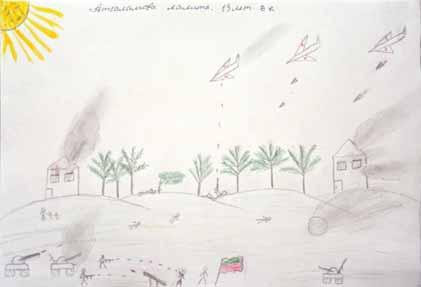
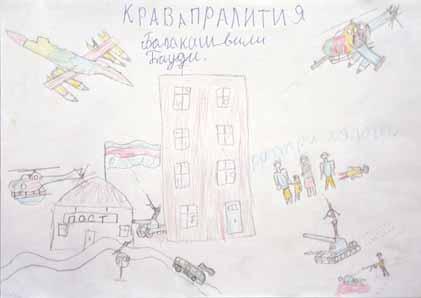
Tony Hanmer has lived in Georgia since 1999, in Svaneti since 2007, and been a weekly writer and photographer for GT since early 2011. He runs the “Svaneti Renaissance” Facebook group, now with nearly 2000 members, at www.facebook.com/ groups/SvanetiRenaissance/ He and his wife also run their own guest house in Etseri:
www.facebook.com/hanmer.house.svaneti
GEORGIA TODAY MARCH 24 - 30, 2023 10 SOCIETY
BLOG BY TONY HANMER
Popularizing Georgia, Protecting Nature - That Feeling of Being Named a Welcome to Georgia Awards “Best Event Organizer” Finalist
BLOG BY MARIAM AVAKOVA
It was an unpredictable, beautiful emotion. The Welcome to Georgia Award (WtGA) is given to those who work in tourism. Quite apart from the fact that I am not directly involved in tourism, I believe that the link between blue economy growth and more stable and healthy tourism, and youth participation in that, is significant.
The Welcome to Georgia Award’s main goal is to express gratitude to those who get Georgia's voice heard around the world, and to say "Welcome to Georgia.”
During the past 10 years, I have been able to promote my country worldwide just by participating in various youth programs, and I always feel like I’m doing my bit to help my country flourish and connect globally. I’ve always been ready to apply what I learn, and I’m always fueled by self-inspiration and my global imagination. "Think globally, act locally," as the saying goes.
The application for the WtGA was long and complex. Tea from WtGA pushed me not to give up, and my motivation was strong. I've been interested in the WGA for almost five years now, and long wanted to take part in it. This year, I applied and advanced from a straightforward nomination to a finalist for the Best Event Organizer Award.
Not knowing this, though, I nearly didn’t go to the award ceremony because of the dress code, but in the end I picked out one of my mother’s vintage dresses
and off I went. The night was magical, organized to the highest level of décor and music. I was having fun and almost forgot about the award nominations. Then the Best Event Organizer was revealed and a camera appeared in front of me. I couldn't even articulate my emotion, and I froze for a second. Becoming a finalist is an enormous accomplishment for me, and I consider myself to be a winner.
I was nominated for my organizing a European Maritime Events (EMD) event here in Georgia, and it all started online, showing just how virtual events can play a significant part in personal growth if used strategically.
During the pandemic, I became an ambassador for the Young Black Sea Community, and was also accepted onto a Malta University Ocean Governance program. I wanted to put into practice what I learned there. I strongly believe knowledge should be shared, and that doing so enhances professionalism. I discovered a call for Youth4Ocean advocates and submitted an application with my proposals. After receiving confirmation that I’d been chosen and that my proposals had been accepted, I joined the Youth4Ocean advocacy group. It was exciting to work with other young professionals, and with the help of my virtual colleagues, I put my energy into organizing the Arctic Ocean Literacy event, and was proud to act as the moderator for the panel on Youth and the Arctic Ocean Networking Event for Let's Listen to the Arctic Oceans.
Once EMDinMyCountry established
the European Maritime Event, I applied as an individual with experience. It was the first time an individual had been given the responsibility of managing an EMD event, and the first time it was done in Georgia. It contributed to putting Georgia on the EMD map in order to promote my country's environmental research contribution and marine special planning potential. EMDinGeorgia supported the eco-friendly TENE USB cables produced from melted plastic bottle caps. I support the New Plastic Economy, which aims to reduce plastic pollution by developing stable new plastic recycled products with economic, social, and environmental benefits.
The EU4Ocean Forum invited me and other colleagues to the EU4Ocean Summit in Ravenna. I was overjoyed and honored. After returning to Georgia, I focused my efforts on organizing the EMDinGeorgia event, for which I was so highly recognized by the Welcome to Georgia judges. Although I was the only Georgian participant in the Youth4Ocean forum and EMD Ravenna event, I felt like I was promoting Georgia and doing my best for my country.
If you ask me where Georgia is, I will tell you that Georgia is a Black Sea Country, and that we humans divide the world, but nature does not. The ocean, like the Black Sea, is a large marine world with various ecosystems. My passion for marine life has existed since childhood, and, as a young scientist with a Master of Science in Natural Resources, I like to invest my energy in ocean or marine related fields.
The Welcome to Georgia Award is a
great motivator not only for me but also for my peers to continue bringing international benefits to Georgia and to promote it on the global stage. I've been honored to raise awareness of what a great place Georgia is for scientific tourism, investment in education programs, youth support, and so on.
The WtGA nomination is the first example of young people receiving recognition who otherwise have little visibility in tourism but who make valuable contributions to represent and promote their country. We, as young contributors through non-formal education and as international event participants or organizers, must not be overlooked. We are
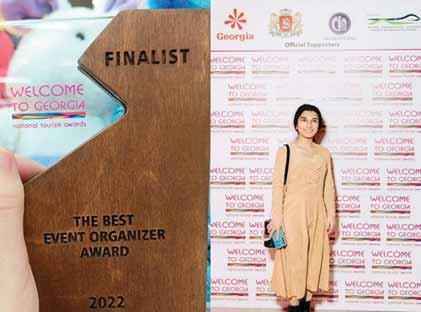
not only benefactors of tourism but also active participants in it. I believe that now is the time to bring young voices on board as we make big decisions that will set the course for the tourism sector for years to come and make up a significant proportion of the tourism workforce, providing opportunities for everyone, regardless of their backgrounds or academic attainment. Young individuals can make a big contribution to the promotion of Georgia through our activities and initiatives. I hope my nomination will be an inspiration for a new chapter among the award categories next year, perhaps the “Welcome to Georgia Youth Tourism Impact Award"?
“The Mountains Are Calling and I Must Go”
incredible geographic feature, but also a way of life. This vision, framed in the title, is perfectly captured in the quote from 19th century environmentalist and preservationist John Muir.
Often referred to as the "Father of the National Parks,” Muir is one of the most commonly known to have lived the proverbial “mountain man” lifestyle. Oneness with nature, preservation of its beauty, and embracing the wilderness all encompass his vision on how life should be lived. In Georgia, this view is still alive in many of the nation’s remote regions.
The preservation efforts of the Georgian government are admirable. Complete with national parks, preservation areas, and historically designated areas, the country works diligently to protect its natural beauty.
These mountains are valuable as farms; homes and tourism thrive in their high valleys. However, much of the population in this sector lives in relative poverty due to their isolation.
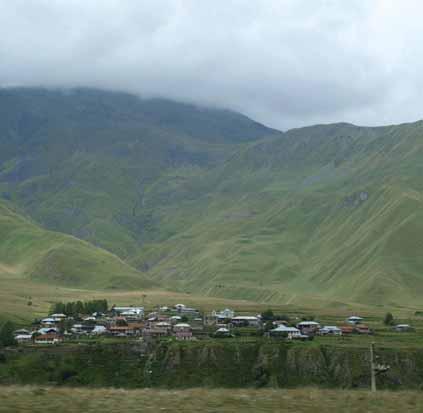
to these behemoths than initially meets the traveling eye.
lages gives a true sense of disconnection from modernity, but also a sense of the need to provide more to these humble but hardy folk.
For travelers, the journey into the mountains and the time spent in its green folds is as necessary as water to the thirsty. It is a rite of passage for anyone who wishes to call the country home, even if only for a few days or years. Like
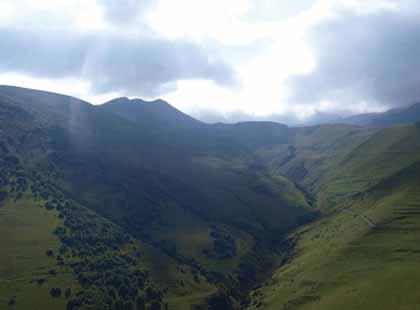
imbibing one’s first glass of Georgian wine, or indulging in the first of many khinkali, the mountains too deserve one’s attention. Likewise, they deserve the attention of those that can and must preserve their natural beauty. In the words of Muir himself, “between every two pine trees there is a door leading to a new way of life” and a new path into Georgia’s natural wonders.
With the winter largely behind us, the spring and summer travel season is here. While flocks of people from around the world come to see Tbilisi, Batumi, and the litany of ancient churches, the natural wonders on the Caucasus range are among the best destinations. Regions such as Samegrelo, Racha, and Tusheti all have their unique “flavor” of mountain life. However, there is more
Arguably, Georgia’s most alluring feature is its neck-craning, sky-scraping mountains that have been the subject of poems, stories, and legends for centuries. While some may see these as rugged and inhospitable territory, Georgians for centuries have called these home, carving their livelihoods from the very stones and earth of these heights. Today, visitors come to admire this hearty lifestyle from around the world.
A small cohort of these visitors decide to make this land their home. Mountains, for these individuals, are not only an
PUBLISHER & GM
George Sharashidze
COMMERCIAL DEPARTMENT
Commercial Director: Iva Merabishvili
Marketing Manager: Natalia Chikvaidze
EDITORIAL DEPARTMENT:
Editor-In-Chief: Katie Ruth Davies
“The people who live in Georgia’s highlands are hardy and resilient by nature. But they need support to protect their livelihoods and their natural surroundings. UNDP is working to ensure that this distinctive feature of Georgian culture can survive and thrive,” said Louisa Vinton, former head of the UNDP mission in Georgia.
Their oneness with nature has made them a unique part of the region. As opposed to living “on” nature, as many of those in large cities do, the people of the mountains live in the nature. Traveling through some of these remote vil-
Journalists: Ana Dumbadze, Vazha Tavberidze, Tony Hanmer, Emil Avdaliani, Nugzar B. Ruhadze, Michael Godwin, Ketevan Skhirtladze, Mariam Mtivlishvili, Erekle Poladishvili
Photographer: Aleksei Serov
Website Manager/Editor: Katie Ruth Davies
Layout: Misha Mchedlishvili
Webmaster: Sergey Gevenov
Circulation Managers: David Kerdikashvili, David Djandjgava
ADDRESS 1 Melikishvili Str.
Tbilisi, 0179, Georgia
Tel.: +995 32 229 59 19
E: info@georgiatoday.ge
F: GeorgiaToday
ADVERTISING & SUBSCRIPTION
+995 555 00 14 46
E-mail: marketing@georgiatoday.ge
Reproducing material, photos and advertisements without prior editorial permission is strictly forbidden. The author is responsible for all material. Rights of authors are preserved. The newspaper is registered in Mtatsminda district court.
Reg. # 06/4-309
GEORGIA TODAY MARCH 24 - 30, 2023 11 SOCIETY GEORGIA TODAY
BLOG BY MICHAEL GODWIN
The mountains around the Gergeti Trinity Church, near Stepantsminda, in northern Georgia. Photo by Mike Godwin
Me, Mariam Avakova, at the Welcome to Georgia Awards










 ANALYSIS BY EMIL AVDALIANI
ANALYSIS BY EMIL AVDALIANI


























